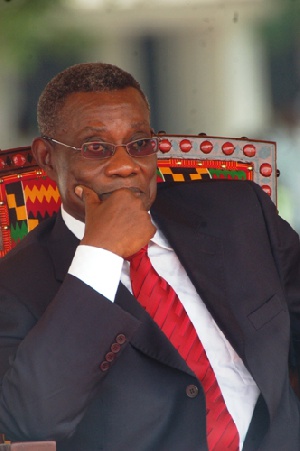- Home - News
- TWI News | TV
- Polls
- Year In Review
- News Archive
- Crime & Punishment
- Politics
- Regional
- Editorial
- Health
- Ghanaians Abroad
- Tabloid
- Africa
- Religion
- Election 2020
- Coronavirus
- News Videos | TV
- Photo Archives
- News Headlines
- Press Release
General News of Thursday, 5 July 2012
Source: GNA
Ghana criminalises migrant smuggling
President John Evans Atta Mills has assented to the Parliamentary bill to bring into effect an amendment in section 52(2) of the Immigration Act, 2000 (Act 573) to criminalizes migrant smuggling in the country.
The new law, Immigration (Amendment ) Act, 2012, has since 29th June, 2012 been gazetted.
Article 3 of the United Nations Protocol Against the Smuggling of Migrants define “migrant smuggling” as “Procurement , in order to obtain, directly or indirectly a financial or other material benefit, of the illegal entry of a person into a state Party of which the person is not a national of a permanent resident”.
“It was necessary to criminalise migrant smuggling because it is a predicate offence for money laundering under the Anti-Money Laundering Act, 2008 (Act 749)” Mr. William Kwasi Aboah, Minister for the Interior said on Thursday.
With the amendment so effected, Ghana’s Immigration Act was now compliant with international standards on money laundering.
Opening a two-day conference on Human Smuggling and trafficking organized by the Ghana Immigration Service ((GIS) in Accra, Mr. Aboah in a speech read for him by Mr. Kobby Acheampong, Deputy Minister for the Interior, thanked members of Parliament for passing the Bill under a certificate of urgency.
The conference is on the theme: “Building Partnerships to Counter Human Smuggling and Trafficking in Ghana” and is being attended by personnel of the Service nationwide and other participants from Nigeria, Diplomatic corps and journalists.
It aims at building the capacity of officers of the GIS and its partner agencies in the use of information-gathering, expertise in intelligence-gathering and skills, as important tools for effectively tackling criminal networks that operate behind organised irregular migration.
Mr. Aboah noted that with the world becoming a global village, it was faced with the implication of migration since its linked together by a web of interdependence, co-operation, collaboration and collective endeavours in many human activities.
This means no particular continent, regional or sub-regional group or country could operate alone or survive on its own in dealing with migrants smuggling and human trafficking, which had become issues of alarming concerns in contemporary times.
The Sector Minister therefore called for collaborative efforts in combating the phenomena of migrants smuggling and human trafficking as “a twin global canker”.
“Considering the sophisticated nature of how the twin crimes are perpetrated with perfection an impunity, we all need to adopt multi-faceted partnership approaches if we are to achieve any remarkable successes in the fight against human smuggling and other forms of irregular migration in Ghana.
He said strategies should also be put in place to eradicate the phenomenon by dismantling the syndicated organizations that operate clandestinely behind the inhuman business of human smuggling and trafficking.
Mr. Aboah assured the GIS of government resources and support to ensure that it delivered on its stator objectives of controlling and managing migration in Ghana effectively and efficiently with socio-economic development and national security interests as major concerns.
Dr Peter Wiredu, Acting Director of Immigration Service and Strategic Programme Manager, Thematic Programme, said human trafficking which had an ancient origin had become a serious global menace imparting negatively on both victims as well as most developed and developing countries.
“What makes the phenomenon more serious is its potential to occasion the loss of precious lives of poor innocent people who are often unduly taken advantage of by smugglers in their quest to seek the so-called greener pastures and employment in developed countries”.
Dr Wiredu explained that human trafficking had the element of force or deceit with victims having no choice and are forced across territorial borders to be exploited.
Migrant smuggling is aimed for smugglers to obtain short-term financial or material benefit. The general practice refers to consensual transactions where the transporter and the transportee agree to circumvent immigration control for mutual advantageous reasons.
Dr Wiredu said there was evidence that Ghana qualifies as a source, transit and destination country in the context of migrant smuggling and human trafficking, adding that the recent Libyan crisis and its subsequent mass evacuation of about 25,00 Ghanaians attest to the fact that Ghana was really a source country.
He said between January 2010 and May 2012, 124 cases involving migrant smuggling were dealt with, through interception by Immigration Officers at various entry points, especially at the Kotoka International Airport.
He said the conference would therefore serve as a way forward for Ghana as a country to curb the disturbing emerging trends in migrant smuggling and human traffic king which was an inhuman menace.
Mr. Claude Maerten, Head of the European Union Delegation in Ghana, said trafficking of human beings was an extremely serious crime and a gross violation of human rights which could be classified as a modern form of slavery and that the issue had become a priority for the EU.
He said there was currently a global approach between EU Countries and Non-EU countries based on the common identification of common interest and challenges of human trafficking.
“Through the sharing of experiences, challenges and best practices on fighting the crime, this conference would provide the framework for sustaining the progress made on the menace into the future”, Mr. Maerten added..
Madam Morgane Nicot, Associate Expert on Organized Crime and Illicit trafficking branch, UN Office on Drugs and Crime, said Ghana had to notify the UN for ratifying the Immigration Amendment law to become the 131st country out of the over 200 countries which had ratified the law.
She stressed on the need for the country to see to the implementation of the law to dully punish traffickers to deter others from engaging in the practice and to continue to protect the victims.**











